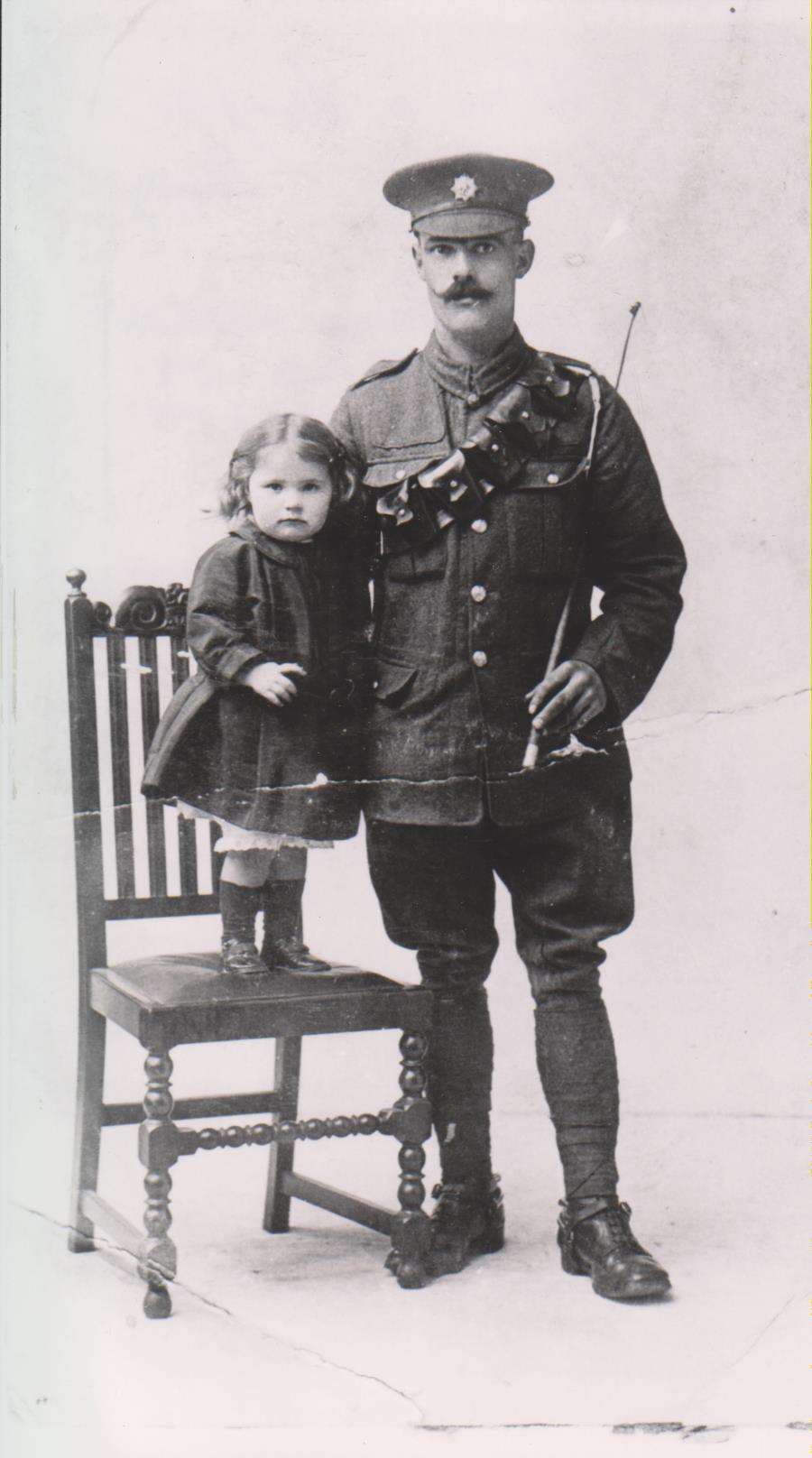
Vicky Hurwood’s great uncle, Septimus Frederick Herbert Allen was born in Richmond on 1 December 1891. He was the seventh son of Leonard and Mary Allan.
He was awarded the 1915 Star and so joined the British Army before the introduction of conscription. Arriving in France on 25 January 1915, he initially served with the Army Service Corps before being transfered to the 9th battalion, Northumberland Fusiliers. 48457 Private Septimus Allan was Killed in Action on 25th November 1917 and having no known grave he is one of the 35,000 men commemorated on the Arras Memorial. His name is also listed on the Richmond War Memorial.

Explore more memories from the ribbon
-
George Johnson
Edith Purkiss wanted to tell us about her father’s war service. George Johnson Junior was a Richmond lad whose father, also called George had seen active service in Egypt with the West Yorkshire Regiment. The 1911 census shows George Jnr was working as a groom and living in Richmond at 20 Bargate along with his parents and siblings. George Jnr enlisted into the Yorkshire Regiment on 3rd September 1914. Having survived the First Battle of the Somme unscathed he was later injured at the Second Battle of the Somme in 1918. He lay in no man’s land for a considerable amount of time, wounded, until he was carried to safety by Mr Buchanan who later became manager of Timothy Whites & Taylors chemist shop (now Boots). George was severely wounded in his right leg and left arm, and was sent to a convalescent hospital in Sheffield to recover. His wounds were so severe that he was discharged, aged 24 years on 26th June 1918. Although he survived, George suffered from ill health due as a result of his wounds all his life. Ironically, he was finally granted a war pension of the day he died, 15th June 1959.
-
Howson Brothers
Three members of the same family served with the Lincolnshire Regiment. Seth William George Howson served with the regiment and received both the Queens South Africa and the Kings South Africa medals for his service during the South African Wars 1899-1902. He survived and is listed as living in Lincoln in 1911 along with his wife Elizabeth and his two sons George William and Arthur Balfour. Both his sons served with the Lincolnshire Regiment during the First World War. Sgt George William Howson, the elder son, worked as a labourer and painter prior to joining the war effort. He served with C Coy of the 1st and 4th Battalions of the Lincolnshire Regiment. Sadly he was killed on 13th October 1915. He was awarded the Victory Medal and the British War Medal posthumously and his effects were left to a Miss Sarah Ann Petty. We do not know how Miss Petty and George were related; was she a family relation or a future wife? CSM Arthur Balfour Howson MM survived the war and was awarded a Military Medal and a silver war badge in addition to the First World War medal trio. The Military Medal was awarded for bravery in battle, but no citation survives to describe the specific action for which Arthur received his. Aged 23, Arthur married Emma Eliza Stanford in 1916 in Lincoln. He worked in the manufacturing sector after the war, and is listed as in charge of Stationery & Mailing depots on the 1939 Register….
-
William Hird
William Hird was nominated for the Ribbon of Remembrance by Dianne Evans, and his story illustrates a problem that can occur with records that are a century old. Thanks to the original 1914-16 enlistment leger at the Green Howards Museum, we can say with some confidence that William enlisted on 10th December 1914 in the City of Durham and that he was posted to the 3rd Battalion, based at West Hartlepool on 18th January 1915. According to his medal card 18390 Acting Lance Corporal William Hird served in France from 19th September 1915, and was entitled to the 1915 Star, the British War Medal and the Victory Medal. William is recorded on the ‘Soldiers died in the Great War 1914-1919’ database as having died on 29 September 1916 as a Private in the 7th Battalion of the Yorkshire Regiment. This might have been the case, but on examining the battalion war diary, the 7th Battalion were away from the frontline in training and there are no records of any deaths that day. Of course soliders would often die from wounds days after an offensive, however the Green Howards Gazzette for December 1916 records that 18390 W Hird was Killed in Action – there is a separate list for those who Died of Wounds. On further investigation, the Register of Soldier’s Effects lists William as being in the 6th Battalion when he was killed in action in France. The war diary of 6th battalion recounts the attempted assault on ‘Stuff Redoubt’…
